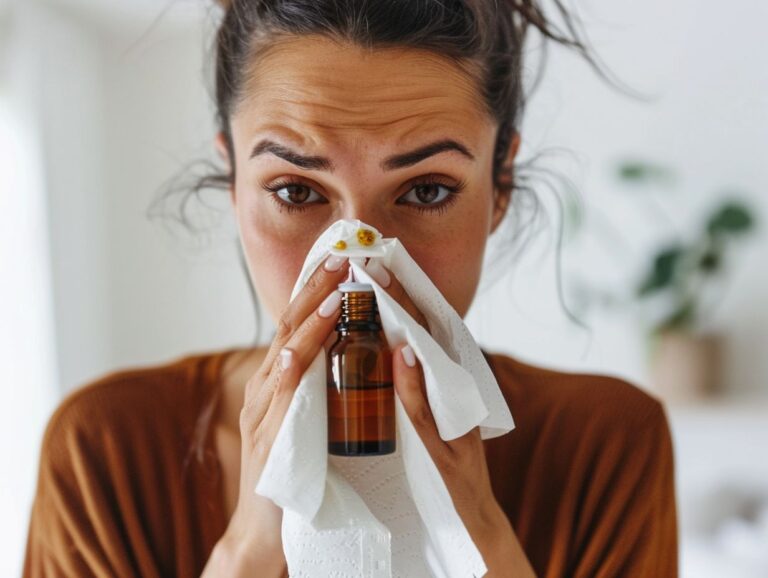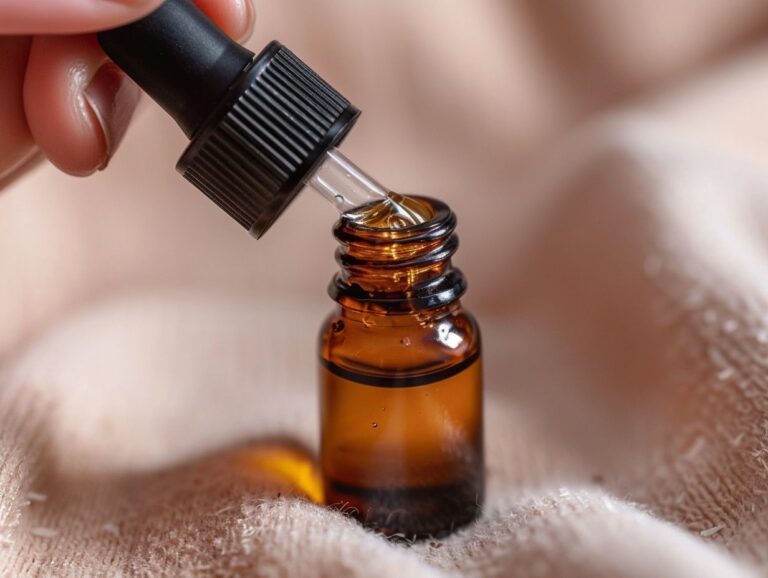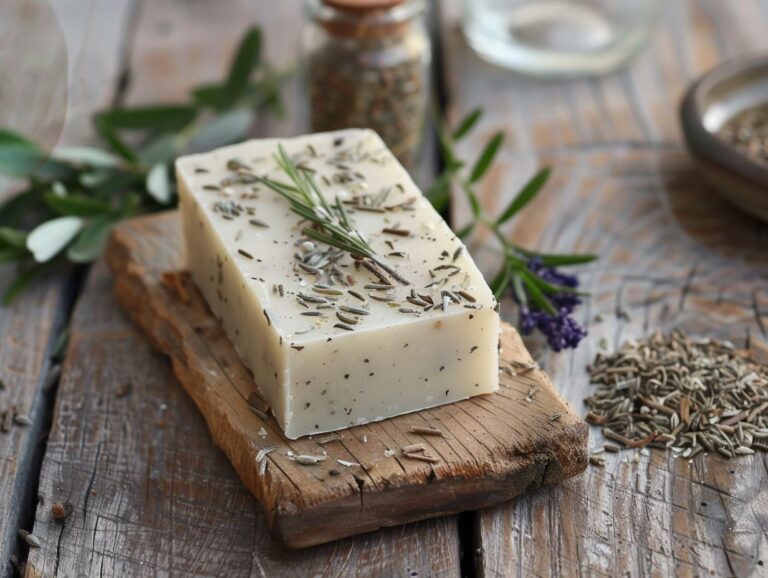Why Can’t I Put Essential Oils on Skin
Essential oils have gained immense popularity in recent years for their various health and wellness benefits.
When it comes to using these powerful oils, there are important considerations to keep in mind, especially when it comes to applying them to the skin.
We will explore the risks and precautions associated with using essential oils topically, as well as alternative methods for safely enjoying the benefits of these potent oils.
If you’re curious about the dos and don’ts of using essential oils on your skin, keep reading to learn more.
Key Takeaways:
What Are Essential Oils?
Essential oils are natural aromatic compounds found in plants, extracted through distillation or cold-pressing methods. These oils capture the plant’s scent and flavor, known as its ‘essence,’ and contain the plant’s beneficial properties.
The process of extracting essential oils varies based on the plant type and desired properties. For example, lavender essential oil is often extracted through steam distillation from the flowers of the lavender plant, while tea tree oil is commonly obtained through the steam distillation of the tea tree leaves. These oils are then used in various applications such as skincare, where lavender oil helps soothe skin irritations, and tea tree oil has antibacterial properties combating acne.
Essential oils like ClarityRx blend unique combinations of oils to create specialized benefits. For instance, ClarityRx Essential Oil blends aim to promote relaxation, clarity, or focus. Such oils find extensive use in aromatherapy, where diffusing specific blends can uplift moods or alleviate stress, contributing to overall well-being.
Why Are Essential Oils Popular?
The popularity of essential oils stems from their numerous health benefits and therapeutic properties. These oils are known for their natural healing abilities, stress-relieving effects, and pleasant fragrances.
One of the primary reasons essential oils have gained widespread popularity is their versatility. Whether it’s the invigorating scent of peppermint that boosts focus or the calming aroma of orange that promotes relaxation, these oils cater to various wellness needs. Many individuals turn to essential oils for their role in emotional balance and overall well-being. The National Association for Holistic Aromatherapy acknowledges the effectiveness of essential oils in enhancing both physical and mental health, making them a go-to choice for self-care routines across the globe.
How Are Essential Oils Used?
Essential oils can be used in various ways, including skincare routines, aromatherapy practices, and household diffusion. Their versatile nature allows for both topical and aromatic applications.
Skincare products benefit immensely from the addition of essential oils, offering natural remedies for a range of skin concerns. Companies like VINEVIDA incorporate these oils in their formulations, promoting healthy and glowing skin.
In aromatherapy, diffusers disperse these fragrant essences into the air, promoting relaxation and Peace Of Mind .
For massage enthusiasts, essential oils make excellent additions to massage oils, enhancing the therapeutic effects.
In humidifiers, these oils not only create a pleasant ambiance but also help in maintaining a balanced humidity level in the surroundings.
Can Essential Oils Be Applied Topically?
Topical application of essential oils is common, but it is essential to dilute them with carrier oils before direct skin contact. Carrier oils like coconut oil or jojoba oil help minimize skin sensitivity and maximize absorption.
Ensuring proper dilution not only reduces the risk of skin irritation but also ensures the safe application of potent essential oils, such as chamomile, known for its calming properties.
When incorporating essential oils into your skincare routine, selecting the right carrier oil is crucial for efficacy. For example, to soothe dry skin, opt for nourishing oils like sweet almond or essential oils skin safety oil.
Live + Be Well emphasizes the importance of practicing caution when applying essential oils to avoid adverse reactions and always recommends performing a patch test before widespread use.
Why Should Essential Oils Not Be Put on Skin?

Direct application of undiluted essential oils can lead to adverse effects on the skin, such as redness, itching, or even burns, especially in individuals with sensitive skin.
Certain essential oils have phototoxic properties, which can cause skin damage or sensitivity when exposed to sunlight after application.
It is essential to perform a patch test before using any new essential oil to check for any allergic reactions or sensitivities.
Special care should be taken with vulnerable populations like pregnant women and older adults, as some essential oils can have harmful effects on them or the unborn child.
What Are The Risks Of Applying Essential Oils On Skin?
Applying essential oils directly to the skin without dilution can lead to various risks, including skin irritation, redness, itching, and in severe cases, burns or allergic reactions. Understanding the potential risks is crucial for safe usage.
Direct skin contact with undiluted essential oils poses a significant risk due to their concentrated nature. The high concentration of active compounds in essential oils can overwhelm the skin, resulting in irritation and inflammation.
Patch testing is a key step in assessing how your skin will react to a specific essential oil. By applying a diluted form of the oil to a small area of skin and waiting for any adverse reactions for 24 hours, you can minimize the chances of experiencing a severe skin reaction.
- Recognizing skin reactions early is essential. Symptoms such as redness, itching, swelling, or a burning sensation indicate a negative skin response.
- In case of a skin reaction, immediately wash the area with mild soap and water. Applying a soothing agent like aloe vera or lavender oil may help calm the skin.
Can Essential Oils Cause Skin Irritation?
Yes, essential oils have the potential to cause skin irritation, especially when used in high concentrations or on sensitive skin types. Symptoms of skin irritation may include redness, itching, or burning sensations.
Factors that contribute to skin irritation from essential oils include the chemical composition of the oil, individual skin sensitivities, and the method of application.
For instance, certain oils like rosemary are known to be more potent and may lead to stronger reactions.
To prevent adverse effects, always perform a patch test before full application and consider diluting essential oils with carrier oils.
Utilizing reputable brands like Peace Of Mind that offer high-quality, pure essential oils can also minimize the risk of skin irritation.
Can Essential Oils Cause Allergic Reactions?
Essential oils have the potential to trigger allergic reactions in some individuals, resulting in skin redness, swelling, hives, or respiratory symptoms. It is essential to perform a patch test before using new oils.
One of the best practices to determine if you might react to a particular essential oil is by conducting a patch test. This involves applying a diluted geranium oil, for example, to a small area of your skin and waiting to observe any adverse effects. Patch testing helps to identify potential sensitivities or allergies before full topical or aromatic application. If an allergic response occurs, such as itching or rash, it is crucial to refrain from using the oil further and consult a healthcare provider for guidance.
How Should Essential Oils Be Used Safely?
To ensure safe utilization of essential oils, it is vital to follow proper guidelines for dilution, application, and storage. Understanding the precautions and recommended methods of use is essential for a positive experience.
Proper dilution ratios are crucial when using essential oils topically to prevent skin irritation. The standard recommendation is to dilute one to three drops of essential oil in one teaspoon of carrier oil like coconut or almond oil. This helps to reduce the risk of skin sensitivity or adverse reactions.
In terms of application techniques, always do a patch test before widespread use. Apply a diluted essential oil blend like Be Calm A Touch of Lavender on a small area of skin and wait to see if any redness, itching, or discomfort occurs.
What Are The Recommended Methods Of Using Essential Oils?

Recommended methods of using essential oils include aromatherapy, topical application, inhalation, and diffusion through devices like diffusers or humidifiers. Each method offers unique benefits for health and well-being.
- Aromatherapy: Inhaling the pleasant scents of essential oils can help reduce stress, improve mood, and promote relaxation. Simply add a few drops to a diffuser or mix with water for a calming ambiance.
- Topical Application: Diluting essential oils with a carrier oil such as VINEVIDA’s sweet almond oil can create massage blends or skincare products to rejuvenate the skin and soothe muscles.
- Inhalation: Direct inhalation, like breathing in the scent from a few drops on a tissue, can provide quick relief from headaches or congestion.
- Diffusion: Diffusing lemon essential oil in the morning can boost energy levels and create a refreshing atmosphere in your home or office.
Can Essential Oils Be Diluted?
Yes, essential oils should be diluted with carrier oils before topical application to minimize skin sensitivity and ensure safe use. Carrier oils like coconut oil and jojoba oil are commonly used for dilution purposes.
When orange essential oil is diluted correctly, it can be a soothing addition to your skincare routine, promoting a healthy glow and revitalizing your senses. It’s crucial to follow proper dilution guidelines, typically ranging from 1-3% for general topical use. This means you would add about 6-18 drops of essential oil per ounce of carrier oil. Carrier oils play a vital role in this process, not only diluting the potent essential oils but also aiding in their absorption and extending their benefits. Products like Peace Of Mind are specifically formulated blends of essential oils designed to promote relaxation and emotional well-being, showcasing the power of carefully curated combinations.”
What Are The Best Carrier Oils To Use With Essential Oils?
Choosing the best carrier oils to blend with essential oils depends on the desired application and skin type. Popular carrier oils like coconut oil and jojoba oil are excellent choices for moisturizing and enhancing absorption.
Another key aspect to consider when selecting carrier oils is their specific benefits for the skin. For example, sweet almond oil is renowned for its ability to soften and soothe the skin, making it ideal for dry or sensitive skin types. On the other hand, grapeseed oil is lightweight and non-greasy, making it suitable for oily skin or acne-prone individuals.
For a relaxing and calming blend, consider combining lavender essential oil with a carrier oil like argan oil, known for its nourishing and rejuvenating properties. This blend not only promotes relaxation but also helps nourish the skin, providing a holistic experience that enhances both physical and mental well-being. Remember, the right carrier oil can elevate the benefits of your essential oil blend, offering a personalized skincare solution tailored to your unique needs.
What Are The Precautions To Take When Using Essential Oils?
When using essential oils, it is essential to take precautions such as performing patch tests, avoiding direct contact with eyes or mucous membranes, and keeping oils out of reach of children and pets. Special care should be taken for pregnant or breastfeeding women.
Tea tree oil is a popular essential oil known for its antimicrobial properties, but even this potent oil must be used cautiously. Always dilute tea tree oil before applying to the skin, as undiluted use may cause irritation. Pregnant women should consult with a healthcare professional before using any essential oil, including tea tree. The National Association for Holistic Aromatherapy recommends sticking to a 1-3% dilution for most applications. It’s crucial to store essential oils in dark glass bottles away from heat and sunlight to maintain their potency.
What Are The Alternatives To Using Essential Oils On Skin?
In situations where direct application of essential oils to the skin is not suitable, alternative skincare products or formulations can provide similar benefits.
One popular option is sandalwood, known for its calming and skin-soothing properties, which can be found in various skincare products. Live + Be Well offers a range of botanical-based products that combine the benefits of sandalwood with other natural ingredients to promote healthy skin. These formulations not only nourish the skin but also provide a subtle aromatherapy experience, enhancing the overall wellbeing.
Consider incorporating these botanical-based products into your daily skincare routine to enjoy the benefits of essential oils for skin without direct application.
Frequently Asked Questions
Why can’t I put essential oils on my skin?
Essential oils are highly concentrated plant extracts that can be harmful if applied directly to the skin. They are not meant to be used undiluted and can cause irritation, redness, and even burns when used improperly.
What happens if I put essential oils on my skin?
When applied directly to the skin, essential oils can cause skin irritation, allergic reactions, and even chemical burns. This is because they are highly concentrated and can be too strong for the skin to handle.
Can I use essential oils on my skin if I dilute them?
While diluting essential oils can reduce the risk of skin irritation, they should still be used with caution. It is important to properly dilute essential oils with a carrier oil and perform a patch test before applying to larger areas of the skin.
What is a carrier oil and why do I need it to use essential oils on my skin?
A carrier oil is a neutral oil that is used to dilute essential oils and make them safe for use on the skin. They help to reduce the concentration of essential oils and prevent direct contact with the skin.
Are there any essential oils that are safe to use on the skin?
Some essential oils, such as lavender and tea tree oil, are considered safe for topical use when properly diluted. However, it is always important to do your research and properly dilute any essential oils before using them on your skin.
What are the alternatives to using essential oils on my skin?
If you are looking for natural skincare options, there are many alternatives to using essential oils on your skin. You can try using plant-based oils, hydrosols, or natural skincare products that contain small amounts of essential oils already properly diluted.









One Comment